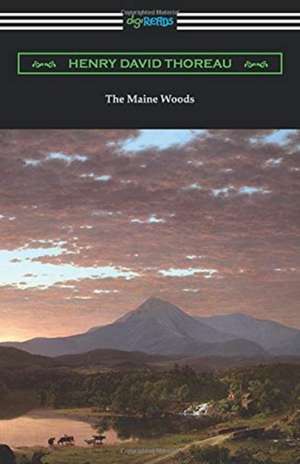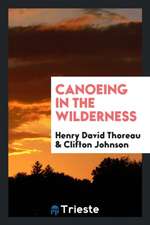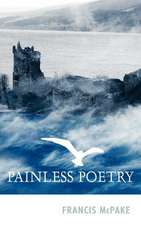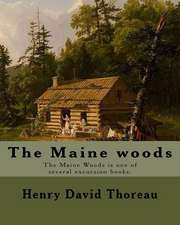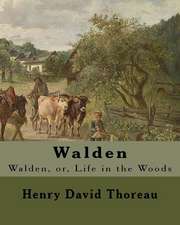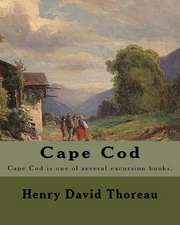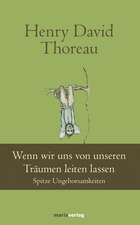The Maine Woods
Autor Henry David Thoreauen Limba Engleză Paperback – 17 iun 2019
Posthumously published in 1864, The Maine Woods depicts Henry David Thoreau’s experiences in the forests of Maine, and expands on the author’s transcendental theories on the relation of humanity to Nature. On Mount Katahdin, he faces a primal, untamed Nature. Katahdin is a place “not even scarred by man, but it was a specimen of what God saw fit to make this world.” In Maine he comes in contact with “rocks, trees, wind and solid earth” as though he were witness to the creation itself. Of equal importance, The Maine Woods depicts Thoreau’s contact with the American Indians and depicts his tribal education of learning the language, customs, and mores of the Penobscot people. Thoreau attempts to learn and speak the Abenaki language and becomes fascinated with its direct translation of natural phenomena as in the word sebamook—a river estuary that never loses is water despite having an outlet because it also has an inlet. The Maine Woods illustrates the author’s deeper understanding of the complexities of the primal wilderness of uplifted rocky summits in Maine and provides the reader with the pungent aroma of balsam firs, black spruce, mosses, and ferns as only Thoreau could. This new, redesigned edition features an insightful foreword by Thoreau scholar Richard Francis Fleck.
- Redesigned edition featuring an insightful foreword by Thoreau scholar Richard Francis Fleck.
- Fleck is a well-respected authority on Thoreau and the author of many books including Henry Thoreau and John Muir Among the Indians.
- Henry David Thoreau (July 12, 1817 – May 6, 1862) was an American author, poet, philosopher, abolitionist, naturalist, tax resister, development critic, surveyor, historian, and leading transcendentalist.
- This book was first published in 1864 (composed partly of articles he had written earlier for periodicals) and still in print, is an insightful reporter’s picture of a rugged wilderness the moment before being irrevocably altered by armies of loggers.
- Today the virgin forest seen by Thoreau is gone; trees have been cut, regrown, and harvested again. But modern travelers — hikers, campers, hunters, fishers, canoeists or back road wanderers — will still find, as Thoreau did, a land “more grim and wild than you had anticipated.” It’s also pin-drop tranquil, teeming with wildlife and, in places, challenging to reach. (NYTimes)
- Following Thoreau into the Maine Woods is hardly a new idea, but it is becoming easier. The Thoreau-Wabanaki Trail was inaugurated, delineating and celebrating Thoreau’s passage on routes that Penobscot Indians had used for thousands of years. (NYTimes)
- Nature tourism is a $37 billion annual industry in the United States (Outdoor Industry Association).
| Toate formatele și edițiile | Preț | Express |
|---|---|---|
| Paperback (9) | 75.87 lei 6-8 săpt. | |
| Penguin Books – 31 aug 1988 | 97.72 lei 3-5 săpt. | |
| Westwinds Press – 31 ian 2014 | 103.26 lei 3-5 săpt. | |
| CREATESPACE – | 118.91 lei 3-5 săpt. | |
| Digireads.com – 17 iun 2019 | 75.87 lei 6-8 săpt. | |
| Lulu.Com – 11 iul 2018 | 89.57 lei 6-8 săpt. | |
| Black Curtain Press – 15 mar 2014 | 98.31 lei 6-8 săpt. | |
| Digireads.com – 31 dec 2005 | 103.03 lei 38-44 zile | |
| Bibliotech Press – 12 iul 2023 | 116.17 lei 6-8 săpt. | |
| COSIMO CLASSICS – 30 iun 2009 | 126.78 lei 6-8 săpt. | |
| Hardback (1) | 205.81 lei 6-8 săpt. | |
| Bibliotech Press – 12 iul 2023 | 205.81 lei 6-8 săpt. |
Preț: 75.87 lei
Nou
Puncte Express: 114
Preț estimativ în valută:
14.52€ • 15.78$ • 12.21£
14.52€ • 15.78$ • 12.21£
Carte tipărită la comandă
Livrare economică 19 aprilie-03 mai
Preluare comenzi: 021 569.72.76
Specificații
ISBN-13: 9781420962710
ISBN-10: 142096271X
Pagini: 200
Dimensiuni: 140 x 216 x 11 mm
Greutate: 0.26 kg
Editura: Digireads.com
ISBN-10: 142096271X
Pagini: 200
Dimensiuni: 140 x 216 x 11 mm
Greutate: 0.26 kg
Editura: Digireads.com
Notă biografică
Naturalist, writer, poet, and philosopher Henry David Thoreau was an American who lived from July 12, 1817, to May 6, 1862. His most well-known work, Walden, is a meditation on simple life in the natural world. He was a forerunner of ecological theory and environmental history, two major influences on contemporary environmentalism. In Concord, Massachusetts, Henry David Thoreau was born into a humble family. Between 1833 and 1837, he attended Harvard College for his studies. He worked as a land surveyor and continued to keep a two million-word notebook for 24 years, recording ever-more-detailed observations on the natural history of the town, which covered an area of 26 square miles (67 square kilometers). Thoreau never got married and never had kids. He proposed to Ellen Sewall, then 18 years old, when he was 23 years old, but she declined on the advice of her father. On May 6, 1862, Henry David Thoreau passed away. He was 44. After contracting TB in 1835, he intermittently experienced its effects. His final words, spoken while he was still conscious, were "Now comes good sailing," followed by the words "moose" and "Indian." In Concord, Massachusetts' Sleepy Hollow Cemetery, he was laid to rest.
Cuprins
FOREWORD:
“DEEP IN THE WOODS WITH
HENRY THOREAU” by Richard F. Fleck
INTRODUCTORY NOTE
KTAADN
CHESUNCOOK
THE ALLEOASH AND EAST BRANCH
APPENDIX
I. Trees
II. Flowers and Shrubs
III. List of Plants
IV. List of Birds
V. Quadrupeds
VI. Outfit for an Excursion
VII. A List of Indian Words
“DEEP IN THE WOODS WITH
HENRY THOREAU” by Richard F. Fleck
INTRODUCTORY NOTE
KTAADN
CHESUNCOOK
THE ALLEOASH AND EAST BRANCH
APPENDIX
I. Trees
II. Flowers and Shrubs
III. List of Plants
IV. List of Birds
V. Quadrupeds
VI. Outfit for an Excursion
VII. A List of Indian Words
Descriere
Descriere de la o altă ediție sau format:
Posthumously published in 1864 The Maine Woods, depicts Henry David Thoreau’s experiences in the forests of Maine, and expands on the author’s transcendental theories on the relation of humanity to Nature. On Mount Katahdin, he faces a primal, untamed Nature. Katahdin is a place “not even scarred by man, but it was a specimen of what God saw fit to make this world.” In Maine he comes in contact with “rocks, trees, wind and solid earth” as though he were witness to the creation itself. Of equal importance, The Maine Woods depicts Thoreau’s contact with the American Indians and depicts his tribal education of learning the language, customs, and mores of the Penobscot people. Thoreau attempts to learn and speak the Abenaki language and becomes fascinated with its direct translation of natural phenomena as in the word sebamook—a river estuary that never loses is water despite having an outlet because it also has an inlet. The Maine Woods illustrates the author’s deeper understanding of the complexities of the primal wilderness of uplifted rocky summits in Maine and provides the reader with the pungent aroma of balsam firs, black spruce, mosses, and ferns as only Thoreau could. This new, redesigned edition features an insightful foreword by Thoreau scholar Richard Francis Fleck.
